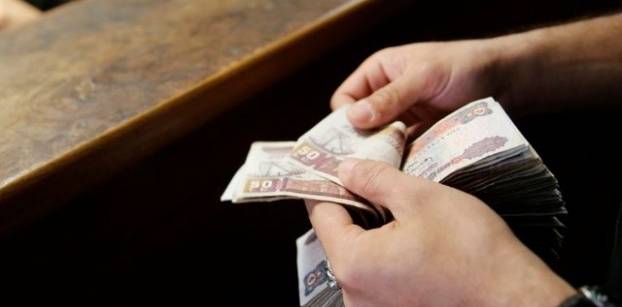Egypt pound tumbles on black market as Saudi suspends oil aid

A customer counts his Egyptian 50 pound notes at an exchange office in downtown Cairo
CAIRO (Reuters) - Egypt's pound has tumbled more than 10 percent to unprecedented lows in the past week after a sudden suspension of Saudi oil aid raised fears of a deeper political rift that could sever the government's much-needed financial lifeline.
Black market traders said they sold dollars at EGP 15 on Tuesday, down from 14.20-14.25 a week earlier. But several importers told Reuters on Wednesday they paid 15.20 to 15.68 to secure dollars amid an acute shortage and plummeting confidence.
The steep depreciation means the gap with the official rate of EGP 8.8 per dollar has widened, increasing pressure on Egypt to devalue its currency and end uncertainty that has discouraged foreign investment.
Egypt has struggled to earn dollars since a 2011 revolt drove away tourists and foreign investors. Its efforts to defend the pound drained reserves from $36 billion before the uprising to $19.6 billion at the end of September.
Egypt has averted crisis largely thanks to billions of dollars in aid from Gulf Arab allies including Saudi Arabia since mid-2013, when the army overthrew the Muslim Brotherhood, a common enemy.
But Saudi Arabia's decision to stop supplies of refined oil products at the beginning of October has raised market fears of a political rift that could severely affect Egypt's economy.
Traders told Reuters last week that Egypt's state oil buyer EGPC had been forced to rapidly increase its tenders despite the dollar shortage and growing arrears to oil producers.
EGPC plans to allocate more than $500 million this month to purchase petroleum products, a government official has said.
"The cost for Egypt is $140 million a week in terms of fuel it has to import...that means that foreign currency which could be available elsewhere in the marketplace is not available," said Angus Blair, Chief Operating Officer at Pharos Holding.
The central bank has been prioritising essential goods such as basic food and medicine for over a year.
Private businesses, particularly those that import luxury items, have been forced to the black market for dollars, causing it to diverge wildly from the official rate.
One commodities trader said he purchased $700,000 on the black market on Wednesday at 15.68 after shopping around. He was quoted levels as high as 15.80.
Another said he was quoted EGP 16 per dollar. A third said he had stopped buying dollars at EGP 14.5, concerned he would be unable to pass on the cost to consumers.
"Basic commodities will be bought but extras and luxuries will be difficult to source and you will reach a point where the prices are too expensive to be bought, and traders... will stop buying because they cannot get rid of their original stock," the first trader said.
"Unless the central bank pumps enough dollars into the system after a devaluation... the dollar will actually shoot up."
Speculation is rife that Egypt could devalue the pound any day to close the gap with the black market.
The central bank governor has said he would consider floating the pound if reserves exceed $25 billion. Reserves have been steadily rising in recent months as Egypt seeks to build a cash buffer ahead of any currency adjustment.
Egypt last month received the first $1 billion tranche of a $3 billion World Bank loan. The United Arab Emirates also agreed in August to make a $1 billion deposit, while the government was in talks with Riyadh to secure $2-$3 billion.
"The crucial issue in this case is whether Egypt would still receive the $2-3 billion in deposit from Saudi Arabia within the next two weeks," Pharos said in a note to clients.









facebook comments